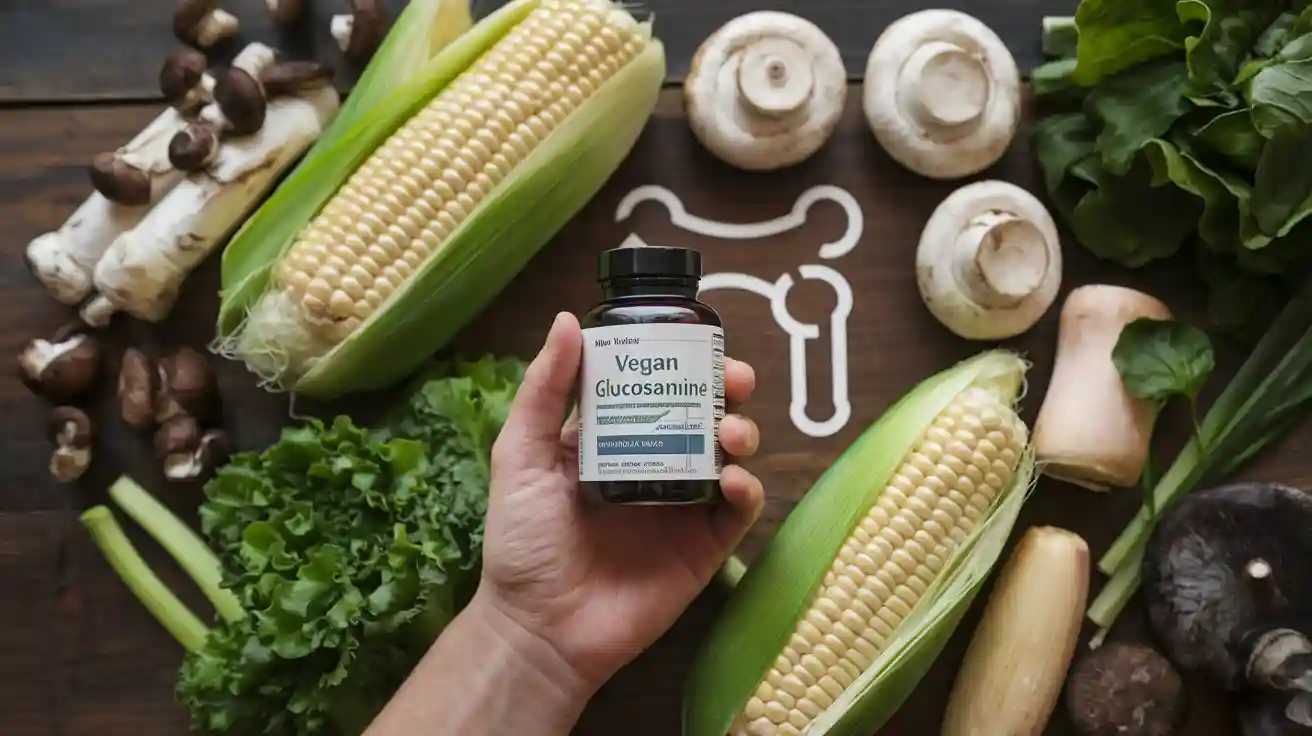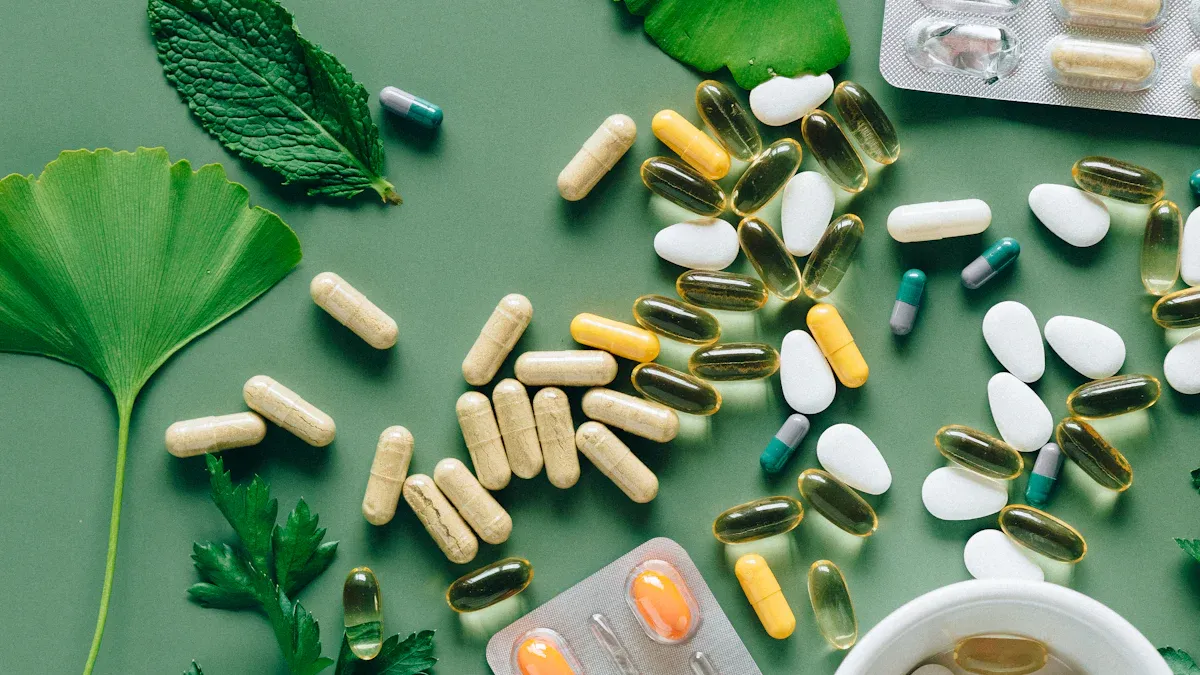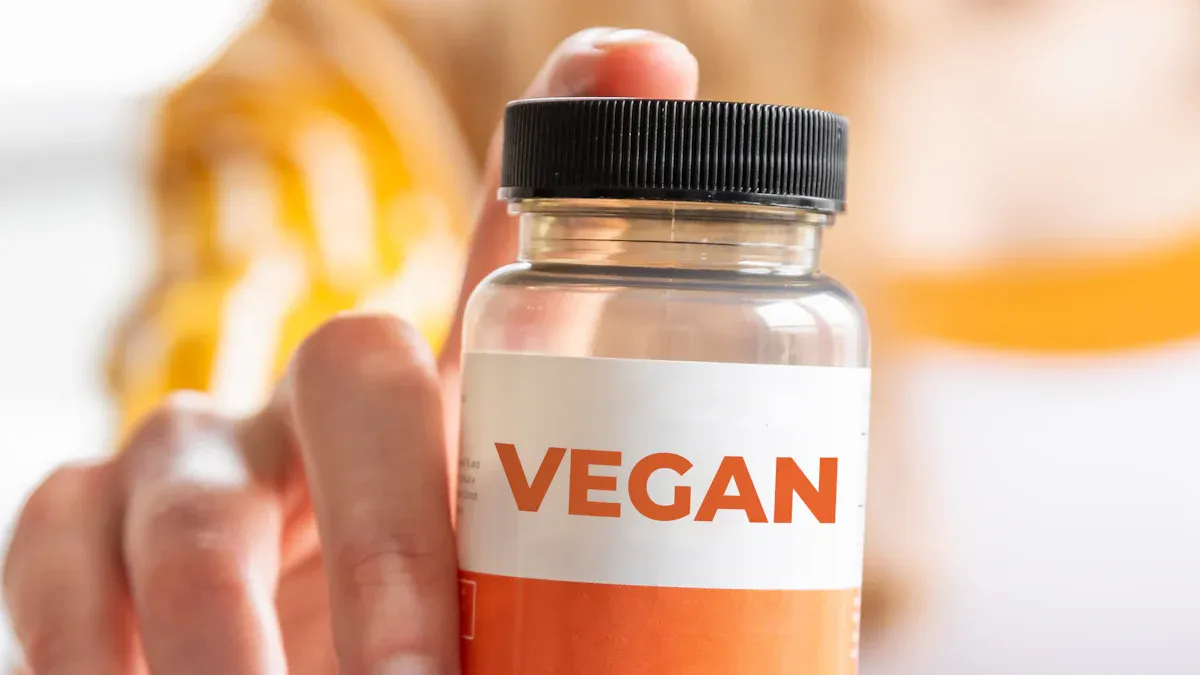What Are Vegan Alternatives to Shellfish-based Glucosamine
Table of Contents

You can find vegan alternatives to shellfish-based glucosamine in several forms, such as corn-based, fungal-derived, and fermentation-produced options. These vegan alternatives appeal to people for many reasons. Some want to avoid shellfish allergens, while others care about animal welfare or the environment.
- Shellfish-derived glucosamine makes up 70.6% of the market, but vegan alternatives are growing in popularity.
- Many choose vegan alternatives due to ethical concerns, environmental impact, or dietary needs.
| Motivation Type | Description |
|---|---|
| Ethical Concerns | Animal welfare is a primary motivation for consumers reducing or avoiding animal products. |
| Environmental Concerns | Many consumers cite ecological reasons as important for their demand for alternative proteins. |
| Dietary Behavior Impact | The strength of motivations varies with dietary habits; vegans show stronger ethical motivations than flexitarians. |
You have more choices than ever when searching for vegan alternatives that fit your lifestyle.
Vegan Alternatives Overview

Vegan Glucosamine Types
You have several choices when searching for vegan glucosamine. These options come from different sources and use unique production methods. Most vegan glucosamine supplements fall into three main categories:
- Corn-based glucosamine: Manufacturers use non-GMO corn and advanced fermentation techniques to create this type. GlucosaGreen® is a well-known example, but many brands offer similar products.
- Fungal-derived glucosamine: Producers extract this form from fungi, such as Aspergillus niger. This process uses fermentation and does not involve any animal ingredients.
- Fermentation-based glucosamine: Companies use plant-based ingredients like corn or mushrooms and rely on fermentation to produce high-purity glucosamine.
You can see the main types and their sources in the table below:
| Type of Vegan Glucosamine | Source |
|---|---|
| Corn-based | Non-GMO corn |
| Fungal-derived | Aspergillus niger (fungi) |
| Fermentation-based | Corn, mushrooms |
These plant-based forms of glucosamine offer a plant-based alternative for anyone who wants to avoid animal products. You can choose a plant-based option if you have a shellfish allergy or follow a vegan diet. Vegan glucosamine contains zero risk of shellfish contamination, so you can use it safely even if you have a sensitivity or allergy to shellfish.
Tip: Vegan glucosamine supplements cost slightly more than traditional shellfish-based glucosamine. For a 30-day supply, you might pay $6-18 for vegan glucosamine, compared to $5-15 for standard glucosamine.
Plant-Based Glucosamine Sources
You can find plant-based glucosamine in several forms. The most common sources include corn and mushrooms. Manufacturers often use corn fermentation because it is clean and efficient. Straw mushrooms also provide a high yield of glucosamine, with up to 56.8150 mg per gram of mushroom hydrolysate.
- Corn fermentation produces high-quality vegan glucosamine.
- Mushrooms, especially Aspergillus niger and straw mushrooms, serve as reliable sources.
- Straw mushrooms offer the highest yield among plant-based ingredients.
You can trust that these plant-based options do not contain animal products. They provide a safe choice for vegans and anyone with shellfish allergies. You can also find plant-based glucosamine made from other plant-based ingredients, but corn and mushrooms remain the most popular.
How Vegan Glucosamine Is Made

Fermentation Process
You might wonder how vegan glucosamine is created without using shellfish. Most companies use a fermentation process that starts with plant-based sugars, often from corn. Here is a simple breakdown of the steps:
- Fermentation: Manufacturers add specific microorganisms, sometimes engineered E. coli, to plant sugars. These microbes help turn the sugars into glucosamine.
- Purification: The mixture goes through several steps to remove impurities. This ensures the glucosamine is safe for you to consume.
- Formulation: The purified glucosamine is then made into powder, tablets, or softgels for you to use.
The full process includes pretreating the raw materials, using enzymes for hydrolysis, filtering, purifying through chromatography, and drying the final product. This careful process helps keep the quality high.
You should know that safety studies on vegan glucosamine made with engineered E. coli show no toxic effects, even at high doses. Most people only report mild stomach issues, such as heartburn or nausea. However, some sources have limited long-term safety data, especially for new fermentation methods. You may also notice that vegan glucosamine sometimes has higher levels of microbial contamination than shellfish-based types, but most products still meet safety standards.
Plant-Based Production
Plant-based production of glucosamine uses ingredients like corn or mushrooms. Producers often choose corn because it is easy to ferment and gives a high yield. Mushrooms, such as straw mushrooms and Aspergillus niger, also provide a good source.
To make sure your vegan glucosamine is truly plant-based, companies use special tests. These tests include enzymatic hydrolysis and HPLC, which confirm the identity and source of the glucosamine. Reputable brands also use third-party labs to check for purity and make sure the label matches what is inside the bottle.
| Production Method | Main Source | Quality Control Steps |
|---|---|---|
| Fermentation (corn) | Non-GMO corn | Enzyme testing, HPLC, 3rd-party lab |
| Fungal fermentation | Mushrooms/fungi | Chromatography, purity checks |
You can trust that plant-based glucosamine goes through strict testing to confirm its vegetable origin and safety. This makes vegan glucosamine a reliable choice for people who want to avoid animal products or shellfish allergens.
Benefits of Plant-Based and Vegetarian Glucosamine
Allergen-Free
You can choose vegetarian glucosamine if you want to avoid shellfish allergens. Many people have shellfish allergies, which affect up to 2.5 percent of the population. Vegan glucosamine and plant-based options pose zero risk of shellfish contamination. You get a safe supplement for joint health without worrying about allergic reactions. Vegetarian glucosamine is made from non-GMO corn or mushrooms, so you do not need to worry about animal ingredients. You can use vegetarian glucosamine for joint pain and inflammation, even if you have sensitivities. This solution gives you peace of mind and helps you support your joints.
- Vegetarian glucosamine is allergen-free.
- Vegan glucosamine is safe for people with shellfish allergies.
- Plant-based glucosamine does not contain animal products.
You can trust vegetarian glucosamine for joint health support if you want a natural anti-inflammatory option.
Environmental Impact
You help the planet when you choose vegetarian glucosamine. Vegan glucosamine uses renewable agricultural sources like corn and wheat. The production process creates less landfill waste—up to 98% less than shellfish-based glucosamine. You avoid harsh chemicals and toxic waste that come from shellfish extraction. Vegetarian glucosamine is an environmentally sustainable alternative for joint health. You support joint health and reduce your carbon footprint at the same time. Plant-based glucosamine uses less energy and creates fewer waste products. You make a positive impact on the environment with every supplement you take.
| Type | Landfill Waste | Water Use | Chemicals Used |
|---|---|---|---|
| Vegetarian glucosamine | Very low | Low | None |
| Shellfish-based glucosamine | High | High | Many |
Choosing vegetarian glucosamine helps protect marine ecosystems and supports a cleaner planet.
Suitability for Special Diets
You can use vegetarian glucosamine if you follow a vegan or vegetarian diet. This joint support formula fits many lifestyles. You get joint health benefits without animal products. Vegetarian glucosamine is suitable for people with dietary restrictions, allergies, or ethical concerns. You can find premium vegetarian glucosamine made from natural ingredients. This supplement supports joint health, reduces joint pain, and helps with inflammation. You get a natural anti-inflammatory effect and joint inflammation relief. Vegetarian glucosamine is a popular choice for joint health support among vegetarians and vegans. You can rely on vegetarian glucosamine for joint pain relief and improved joint health.
- Vegetarian glucosamine is suitable for vegans and vegetarians.
- You get joint health support without animal ingredients.
- Vegetarian glucosamine helps with joint pain and inflammation.
You can choose vegetarian glucosamine as your joint support formula if you want a natural, safe, and effective supplement.
Effectiveness & Safety
Comparison to Shellfish-Based
You may wonder if vegan joint health supplements work as well as shellfish-based glucosamine. Many studies show that plant-based glucosamine can help support joint comfort and mobility. Some people believe only animal-derived glucosamine helps with arthritis, but research shows vegan options also provide the building blocks for healthy cartilage. You get similar benefits for joint support, such as reduced discomfort and better movement.
- Plant-based glucosamine supports glycosaminoglycans, which help keep cartilage strong.
- Studies suggest vegan supplements may help with joint pain and stiffness.
- Some research points out that more data is needed, especially for new fermentation methods.
You should know that clinical trials comparing vegan and shellfish-based production methods have found both types can help with arthritis symptoms. However, some studies have flaws, and long-term safety data for vegan glucosamine is still limited.
Side Effects & Considerations
You want to feel safe when you take joint health supplements. Most people tolerate glucosamine well, whether it comes from plants or shellfish. You may notice mild side effects, such as nausea or stomach upset. These effects are usually not serious and go away quickly.
| Type of Glucosamine | Reported Side Effects |
|---|---|
| Vegan (plant-based) | Nausea, mild stomach issues |
| Shellfish-based glucosamine | Stomach upset, nausea, headache |
You can find different formulations of joint health supplements. Glucosamine sulfate is popular in Europe because it has strong clinical support. Glucosamine hydrochloride is common worldwide and offers more concentrated doses. Your choice may depend on your needs and local regulations.
| Formulation | Concentration | Clinical Support |
|---|---|---|
| Glucosamine Sulfate | Lower per gram | Stronger clinical support |
| Glucosamine Hydrochloride | Higher per gram | Less studied |
You should know that a 2023 meta-analysis found daily use of 1500 mg of glucosamine is safe. Human trials show no serious side effects at doses up to 2000 mg per day. Some studies even report gut health benefits, such as less bloating. Still, researchers say more long-term studies are needed for vegan supplements made by fermentation.
Tip: Always talk to your doctor before starting any new supplement, especially if you have allergies or take medicine for arthritis.
You can choose vegan glucosamine for joint health and allergy safety. Plant-based options offer strong benefits. The table below shows the main advantages:
| Advantages of Vegan Glucosamine Alternatives | Description |
|---|---|
| Sustainability and Environmental Friendliness | Plant-based options are derived from corn fermentation, making them eco-friendly. |
| Reduced Allergenic Potential | Suitable for individuals with shellfish allergies. |
| Gut Health Benefits | Early research indicates support for gut health. |
You see positive results in studies. Vegan glucosamine supports joint comfort and gut health. Healthcare professionals find it safe for daily use. You should talk to your doctor before starting any new supplement.
FAQ
Can you take vegan glucosamine if you have a shellfish allergy?
You can take vegan glucosamine safely. It does not contain shellfish or animal products. You avoid the risk of allergic reactions. Always check the label for purity.
Is vegan glucosamine as effective as shellfish-based glucosamine?
You get similar joint support from vegan glucosamine. Studies show both types help with joint pain and mobility. You can choose either option for healthy cartilage.
What is the main source of vegan glucosamine?
You find most vegan glucosamine made from non-GMO corn or mushrooms. Manufacturers use fermentation to produce it. You can trust these sources for plant-based supplements.
Are there any side effects with vegan glucosamine?
You may notice mild stomach upset or nausea. Most people tolerate vegan glucosamine well. You should talk to your doctor before starting any new supplement.
How do you know if a glucosamine supplement is vegan?
You should look for labels that say “vegan” or “plant-based.” You can check for third-party testing. You avoid animal ingredients by choosing certified vegan products.

Poseidon
Master of Nutritional Epidemiology, University of Copenhagen, Herbal Functional Nutrition Researcher
Focus: The scientific application of natural active ingredients such as Tongo Ali, Horny Goat Weed, and Maca to sexual health and metabolic regulation.
Core Focus:
Men: Use a combination of Tongo Ali (an energizing factor) + Maca (an energy reserve) to improve low energy and fluctuating libido.
Women: Use a combination of Horny Goat Weed (a gentle regulator) + Maca (a nutritional synergist) to alleviate low libido and hormonal imbalances.
Stressed/Middle-Aged Adults: This triple-ingredient synergy supports metabolism, physical strength, and intimacy.
Product Concept:
Based on traditional applications and modern research (e.g., Tongo Ali promotes testosterone-enhancing enzyme activity, and icariin provides gentle regulation), we preserve core active ingredients and eschew conceptual packaging—using natural ingredients to address specific needs.
Simply put: I'm a nutritionist who understands "herbal actives." I use scientifically proven ingredients like Tongo Ali, Epimedium, and Maca to help you make "sexual health" and "nutritional support" a daily routine.
